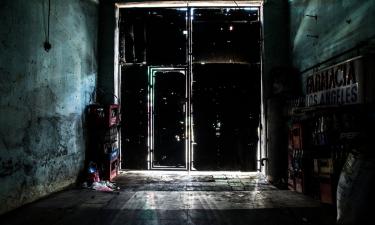Nebojsa Malic: A Trojan Horse in Belgrade Beware Imperial Bureaucrats Bearing Gifts
Timeo Danaos et dona ferentes (tr.). – Virgil, The Aeneid, 2:49 As 2001 draws to a close, so does a circle of destruction in the Balkans that began over a decade ago. From its role as an all-too-partisan observer in the beginnings of the Yugoslav crisis, the Empire has gradually asserted itself as the maker and breaker of kings and nations. A decade after it set the rules for Yugoslavia's bloody destruction, Europe is back at the end of the beginning, trying to "mediate" the survival of Yugoslavia's last remnant. Its envoy is no other than Javier Solana, the Bomber of Belgrade and Murderer of Macedonia. If Macedonia's experience is anything to go by, where Solana goes, Ambassador James Pardew cannot be far behind. And though the United States currently seems preoccupied with events farther East, it can hardly miss an opportunity to crown its conquests in the Balkans by finally subjugating Serbia. UNNECESSARY MEDDLING Vexing as it is that the leaders of Serbia – "reformist" or not – even contemplate, let alone enthusiastically welcome, the presence of NATO's erstwhile leader while the Alliance still occupies a large chunk of Serbian territory, the truly befuddling characteristic of recent talks in Belgrade is that they were absolutely unnecessary. Namely, in late October, Montenegro's secession-minded chieftain met with his Belgrade counterparts and all agreed that the issue of Yugoslavia's survival should be put to a referendum (Reuters, Oct. 26). So persistent was Milo Djukanovic's refusal to talk anything but independence, that both Zoran Djindjic and Vojislav Kostunica agreed (a rare enough event) that further talks would be a waste of time. Perhaps they counted on data indicating that Djukanovic could not win the referendum unless he resorted to some heavy cheating. God forbid, however, that anyone in the European Union's sphere of influence dares achieve a mutually agreeable settlement on any issue without the guidance of Brussels bureaucrats. Their subjects might even get the idea that existence without a mammoth transnational state apparatus might be possible! On cue, the EU and Solana got involved in a "new bid" to prevent the "breakup" of Yugoslavia. CURIOUSER AND CURIOUSER It is possible that all three leaders completely forgot about Europe's "bid" of similar nature some ten years ago, or that they drew completely wrong conclusions about Solana's "mediation" services in Macedonia. Quite possibly, their vanities might have been flattered by the European Union's attention to their internal power squabble – though none seems to have paused to wonder as to the motive behind this sudden curiosity. Yet none of this explains why all three leaders promptly forgot the agreement they had achieved and restarted the talks that – quite predictably – stalled the same way as before. These days, the oft-mentioned definition of insanity – doing the same thing over and over expecting a different result – seems to apply perfectly. THE LOGIC OF LUNACY Only when considering the pattern of Imperial interference developed over the past decade does this kind of behavior gain some inner pretense of logic. Left to their own devices, chieftains of Balkans principalities would likely have found some sort of modus vivendi to stave off the original Yugoslavia's collapse in 1991 – for they knew better than anyone the balance of power in the region and the price of armed conflict. That logic, however, ceased to apply the moment a powerful outside force (whether the EU, the UN, NATO or the US) got involved. At that point, all diplomatic, propaganda and war effort went into enlisting that force on one's own side, thus altering the balance of power. Croatia, Bosnia-Herzegovina, Kosovo and Macedonia are living testaments that this strategy has been effective, just as their dependent, corrupt societies bear witness to the high price of currying Imperial favor. APPETITE FOR CORRUPTION Apparently, Montenegro's Djukanovic initiated the latest round of this "sycophant diplomacy" by declaring that he would gladly renew the talks under Solana's guidance. Why he did so is still a mystery, however, since he had a better chance of seceding if the EU – which officially opposes Montenegro's secession – had been kept out of the deal. Solana knew exactly which buttons to push in the case of Serbia's eagerly pro-Imperial Prime Minister. Desperately needing money to maintain a state apparatus, and through it control all aspects of life in Serbia, Djindjic was easily persuaded by the promise of new IMF funding – and the threat that it could be withheld. Only Kostunica was reportedly reluctant to embrace the new talks – probably wondering about their purpose. However, experience of the past year indicates he will cave in after a while. Djindjic and Djukanovic are two of a kind in many ways. Both lack true popular support for governing, and rely instead on the repressive state apparatus. It, in turn, needs to be fed by money that in both cases comes from the outside – the Empire, to be precise. Both are being blackmailed by threats that the trough will run dry unless they remain compliant, but both know that turning off the spigots completely would deprive the Empire of leverage and is thus extremely unlikely. As a result, they both endeavor to make the best of the bargain, while the Empire gives them just enough to remain in power. USE IT OR LOSE IT The real enigma in this tragic trinity is Kostunica. He may have been the poster-boy of the ragtag coalition that forced Milosevic to abdicate power in October 2000, but he quickly found himself playing second fiddle to the ruthless and much more ambitious Djindjic. Having used Kostunica's popularity to become Serbia's Prime Minister, Djindjic proceeded to seize the reins of power both in the Serbian and – through allies – the federal government. Much has been written here about Djindjic's machinations, his disregard for the law, the courts, the Constitution, and even the rules of political conduct. Yet every time Kostunica could have confronted him, he chose not to. Now Djindjic controls all the levers of power in Serbia and Yugoslavia, leaving Kostunica only in control of the military, which is immobilized by the constant threat of war crimes indictments from the Hague Inquisition – which in turn has made no secret of preferring Djindjic over Kostunica. Keeping in mind Lord Acton's maxim that power corrupts, Kostunica forgot that he was – for better or worse – already in power, and had to use it to the best of his conscience or lose it entirely. Kostunica's fear of possible abuse of power immobilized him; he chose not to act when action was called for. This allowed someone with less moral fiber (but more determination) to usurp and abuse the power in a very real way, thus ironically vindicating Lord Acton's dictum. OF A LARGE WOODEN HORSE So far, the "negotiations" in Belgrade have exhibited a typical pattern of Imperial meddling into affairs the local leaders have been perfectly capable of settling peacefully on their own. They join the long history of such sinister interference, from the most recent "peace talks" in Macedonia to the ill-fated "Conference on Yugoslavia" of the early 1990s. No one has yet bothered to wonder why the EU is so enthusiastic about supposedly preserving Yugoslavia now, when for the past ten years it has been enthusiastic about its destruction. It has long been said that the Balkans needed democracy to prosper. Yet democracy – in its pure, unadulterated form (mob rule) not yet hidden by the elaborate faзade of propriety developed in the Empire – is largely responsible for the nations of former Yugoslavia and elsewhere being afflicted with leaders interested solely in amassing power and personal gain, all too willing to curry Empire's favor in order to triumph in avoidable conflicts. Thus deluded, it is easy for them to ignore the prophetic warning of a war long ago, in a place not so far away: "Beware of Greeks bearing gifts." Though in this case the "Greek" is actually a Spaniard acting on behalf of the European part of the Empire, his superfluous "gift" is nonetheless a great wooden horse, in whose belly who knows what deadly perils lie.
Nebojsa Malic
&to=http://www.antiwar.com' target=_blank>Antiwar.com
Subscribe to Pravda.Ru Telegram channel, Facebook, RSS!



